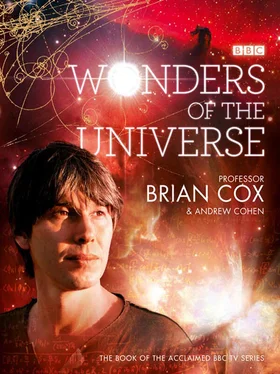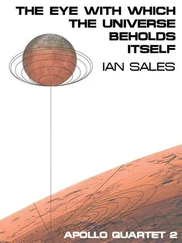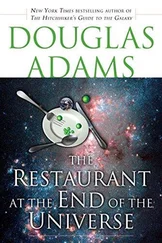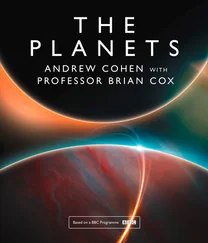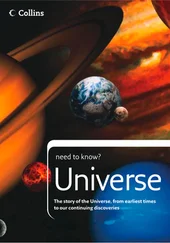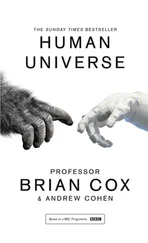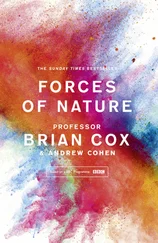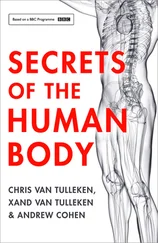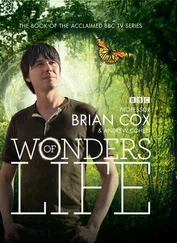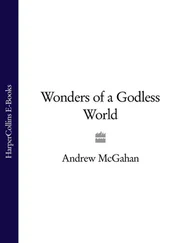For Mum, Dad and Sandra – none of this would have been possible without you
Brian Cox
For my dad, Geof Cohen (1943–2007)
Andrew Cohen
Wonders of the Universe
Professor Brian Cox & Andrew Cohen

HarperCollins Publishers
1 London Bridge Street
London SE1 9GF
www.harpercollins.co.uk
The BBC logo is a trademark of the British Broadcasting Corporation and is under licence.
BBC logo © BBC 1996
The authors assert their moral right to be identified as the authors of this work.
WONDERS OF THE UNIVERSE. Text © Brian Cox and Andrew Cohen 2011. All rights reserved under International and Pan-American Copyright Conventions. By payment of the required fees, you have been granted the non-exclusive, non-transferable right to access and read the text of this e-book on-screen. No part of this text may be reproduced, transmitted, down-loaded, decompiled, reverse engineered, or stored in or introduced into any information storage and retrieval system, in any form or by any means, whether electronic or mechanical, now known or hereinafter invented, without the express written permission of HarperCollins e-books.
A catalogue record for this book is available from the British Library.
Ebook Edition © MARCH 2011 ISBN: 9780007413379
Version 2017-02-03
Copyright
Introduction
The Universe
Chapter 1
Messengers
The Story of Light
Our place in the Universe
Our galactic neighbourhood
Mapping the Milky Way Galaxy
The shape of our galaxy
A star is born
What is Light?
Young’s double-slit experiment
Messengers from across the ocean of space
Chasing the speed of light
The search for a cosmic clock
Speed limits
Time Travel
To the dawn of time
Finding Andromeda
The Hubble Telescope
Hubble’s most important image
All the colours of the rainbow
Hubble expansion
Redshift
The Birth of the Universe
Visible light
Picturing the past
First sight
Chapter 2
Stardust
The Origins of Being
The cycle of life
Mapping the night sky
Stellar nurseries
How to find exoplanets
The orgins of life
The Periodic Table
The universal chemistry set
What are stars made of?
The Early Universe
El Tatio Geysers, Chile
The Big Bang
Sub-atomic particles
Timeline of the Universe: The Big Bang to the present
Matter by numbers
The most powerful explosion on Earth
From Big Bang to Sunshine: The First Stars
Red giant
Star death
Planetary nebulae
The rarest of all
Supernova: life cycle of a star
The beginning and the end
The orgin of life
Chapter 3
Falling
Full Force
The invisible string
The apple that never fell
The grand sculpture
The geoid
The Tug of the Moon
The false dawn
The Blue Marble
Galactic cannibals
Collision course
When galaxies collide
Feeling the Force
The gravity paradox
The land of little green men
What is gravity?
Einstein’s Theory of General Relativity
Into the darkness
The anatomy of a black hole
Chapter 4
Destiny
The Passage of Time
The cosmic clock
The galactic clock
Ancient life
The arrow of time
The order of disorder
Entropy in action
The life cycle of the Universe
The life of the Universe
The Destiny of Stars
The demise of our universe
The death of the Sun
The last stars
The beginning of the end
A very precious time
Searchable Terms
Picture credits
Acknowledgements
About the Author
Credits
About the Publisher
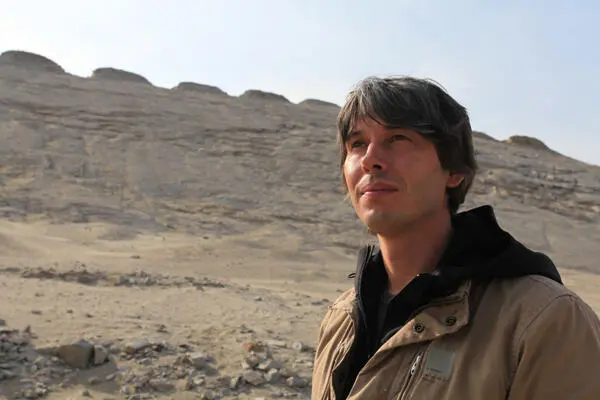
THE UNIVERSE
At 13.7 billion years old, 45 billion light years across and filled with 100 billion galaxies – each containing hundreds of billions of stars – the Universe as revealed by modern science is humbling in scale and dazzling in beauty. But, paradoxically, as our knowledge of the Universe has expanded, so the division between us and the cosmos has melted away. The Universe may turn out to be infinite in extent and full of alien worlds beyond imagination, but current scientific thinking suggests that we need it all in order to exist. Without the stars, there would be no ingredients to build us; without the Universe’s great age, there would be no time for the stars to perform their alchemy. The Universe cannot be old without being vast; there may be no waste or redundancy in this potentially infinite arena if there are to be observers present to gaze upon its wonders.
The story of the Universe is therefore our story; tracing our origins back beyond the dawn of man, beyond the origin of life on Earth, and even beyond the formation of Earth itself; back to events – perhaps inevitable, perhaps chance ones – that occurred less than a billionth of a second after the Universe began.
AN ANCIENT WONDER
On Christmas Eve 1968, Apollo 8 passed into the darkness behind the Moon, and Frank Borman, Jim Lovell and William Anders became the first humans in history to lose sight of Earth. When they emerged from the Lunar shadow, they saw a crescent Earth rising against the blackness of space and chose to broadcast a creation story to the people of their home planet. A quarter of a million miles from home, lunar module pilot William Anders began:
‘We are now approaching lunar sunrise and, for all the people back on Earth, the crew of Apollo 8 has a message that we would like to send to you.
In the beginning God created the heaven and the Earth.
And the Earth was without form, and void; and darkness was upon the face of the deep. And the Spirit of God moved upon the face of the waters.
And God said, Let there be light: and there was light.
And God saw the light, that it was good: and God divided the light from the darkness.’
The emergence of light from darkness is central to the creation mythologies of many cultures. The Universe begins as a void; the Maori called it Te Kore, the Greeks Chaos. The Egyptians saw the time before creation as an infinite, fathomless ocean out of which the land and the gods emerged. In some cultures, God is eternal: He created the Universe out of nothing and will outlast it. In others, such as some Hindu traditions, a vast primordial ocean predates the heavens and Earth. Lord Vishnu floated, asleep, on the ocean, entwined in the coils of a giant cobra, and only when light appeared and the darkness was banished did he awake and command the creation of the world.
We still don’t know how the Universe began, but we do have very strong evidence that something interesting happened 13.75 billion years ago that can be interpreted as the beginning of our universe. We call it the Big Bang. (We must be careful with our choice of words here, because this is a book about science, and the key to good science is the separation of the known from the unknown.) This interesting thing that happened corresponds to the origin of everything we can now see in the skies. All the ingredients required to build the hundreds of billions of galaxies and thousands of trillions of suns were once contained in a volume far smaller than a single atom. Unimaginably dense and hot beyond comprehension, this tiny seed has been expanding and cooling for the last 13.75 billion years, which has been sufficient time for the laws of nature to assemble all the complexity and beauty we observe in the night skies. These natural processes have also given rise to Earth, life, and also consciousness, which in many ways is harder to comprehend than the mere emergence of the seemingly infinite stars.
Читать дальше
